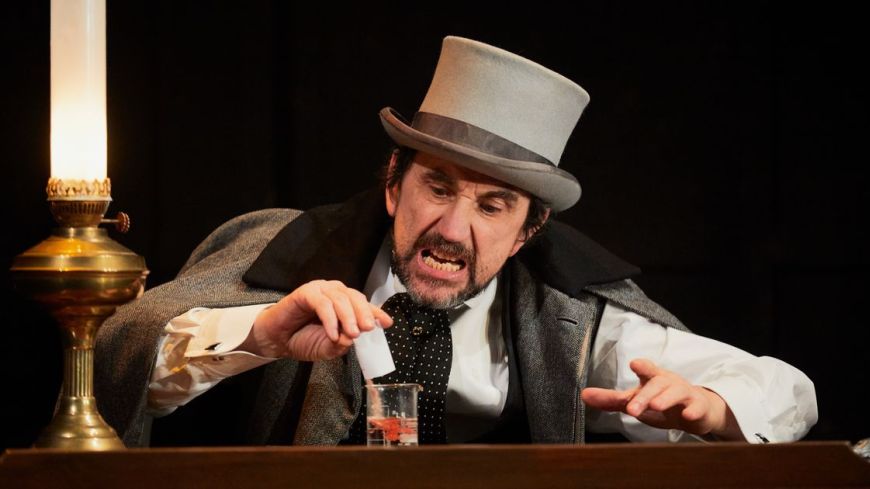
The Strange Case of Dr Jekyll and Mr Hyde astonished its audiences when it was first published in 1886 and has continued to do so for more than a century since. This production by Touring Consortium Theatre Company in conjunction with Rose Theatre Kingston sadly fails to do the same.
A page to stage adaptation is never straightforward, especially for a story whose book is half as long as its script. Despite there being obvious techniques that work better on the page and others that work better on the stage, there is no reason to suspect that this story (which has so much potential for drama) would struggle with this transition. What we may not expect is to have the first pages of the novella narrated to us in a rather static opening. The nod to Stevenson's work, presented almost verbatim, is fine at certain points; but those points must be chosen wisely.
Dr Jekyll is a gentleman and a scientist, and through shocking experimentation, he separates two identities from within himself; Mr Hyde appears, split from Dr Jekyll, a physical personification of evil that simultaneously delights and appalls the good doctor. The questions that the book raises and the ideas it puts forward are numerous and intelligent, concerning life and death, good and evil, duality, responsibility and humanity, and the oppositions it presents are meat and bread for dramatists. Unfortunately, David Edgar's script misses every mark the novella sets up.
There is a frustrating lack of dramatic integrity in the telling of the tale. The first physical transition we see between Jekyll and Hyde is narrated from the original text and the substitution of description for action stalls what little momentum there was, and commits the cardinal sin of telling rather than showing; this seems to be the only theme carried through the play. We may easily forgive the addition of characters and relationships that do not exist in the original text in order to create more on-stage drama and to demonstrate physically what may just be written. What is harder to forgive is that these characters are by and large irrelevant, and that throughout the course of the play the apparent need to give each of them a back story rather eclipses the protagonist and shifts any kind of responsibility away from Dr Jekyll, who's culpability is perhaps the most intriguing thing about the novella.
The intensity of the subject matter is drained constantly by a failure to focus. There are so many things unsubtly explained that there is no effort or imagination involved the audience's part, and therefore very little investment in what is unfolding before us. For something that plays on the gothic genre in all the aesthetics, there is very little of the gothic sensibility within the production.
The set, although interesting to look at pre-show, does not live up to its potential. There are metaphors to be had there as the set covers two levels and the quality of light is different on both; the domestic, private, experimental and horrifying is below street level which is in itself subversive and clever, but at no point are the two levels linked at all which is a terribly missed opportunity, and as the play progresses it appears that the upper level is only there to house a frankly arbitrary singer, who's sole purpose is to cover clunky scene changes.
What could save the production would be a commanding performance from the leading man, but lamentingly this is also only significant by its absence. Hyde comes across as more pantomime than malicious, and there is little contrast between the two selves. His inevitable demise is then painfully explained with exposition that does not apply and fails to tie up any of the ends the sundry characters have frayed.
For a production that should have been captivating for many and varied reasons, it is surprising how much it has failed to engage.
Until Saturday 14th April, 7.30pm Matinee 2.30pm Wednesday, Saturday. Tickets £18-£31.50

